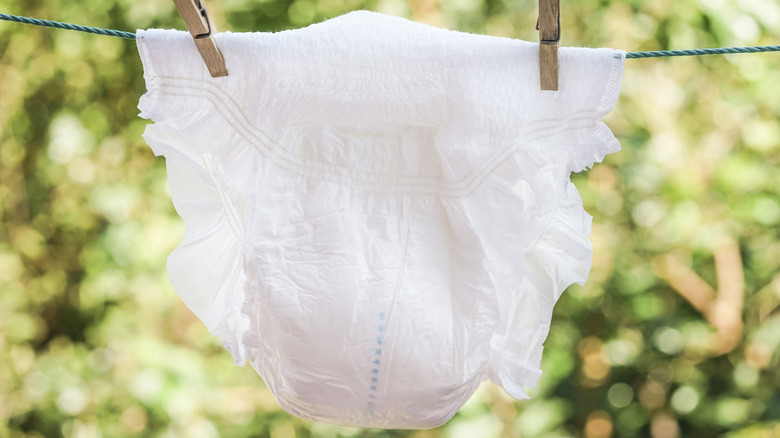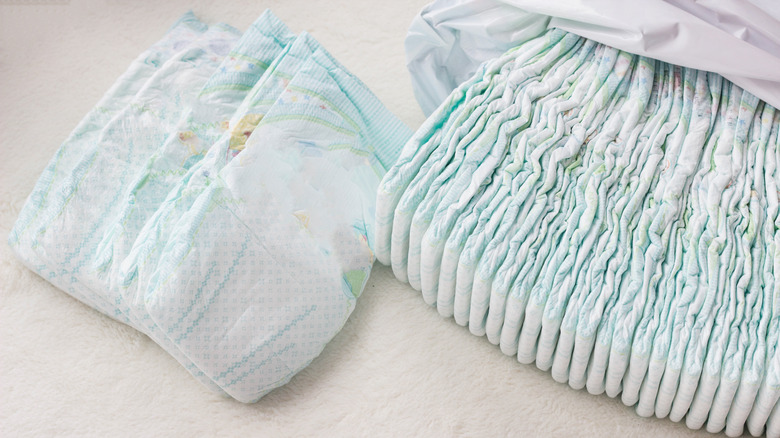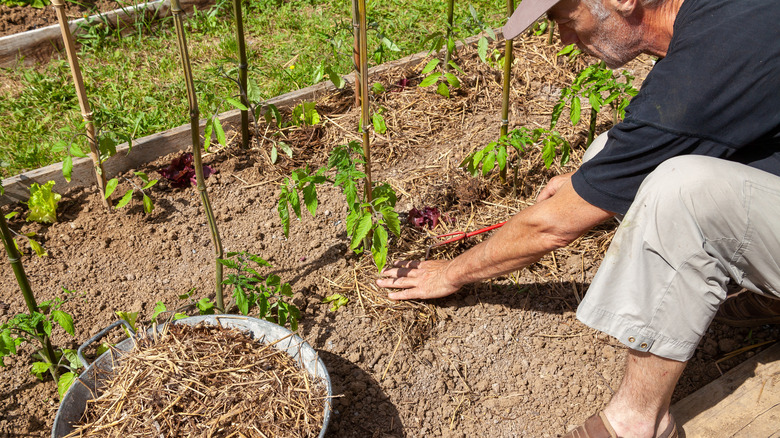Why You Should Steer Clear Of The Diaper Irrigation Trend
Soft, strong, and moisture-retentive: These are some of the qualities that make up good, healthy garden soil. Coincidentally, they're also qualities that describe a good baby diaper! In recent years, a popular gardening myth has put two and two together and suggested that people use clean disposable diapers or the absorbent diaper gel in their gardens to improve irrigation. It's understandable why some people may think that placing a disposable diaper underneath plants is a good way to keep them hydrated, especially for hanging baskets and potted plants. However, they often forget that diapers are designed to trap water, not release it. Because of this, they can actually pull moisture from your soil and stress out your plants.
While they might be your "plant babies," your garden plants don't need diapering. Irrigating your garden with diapers isn't just expensive and counterproductive; it's also concerning because diapers can contain synthetic chemicals and materials that may leach into your produce and affect the environment. Learn more about why you shouldn't use disposable diapers in your garden and safe, alternative methods to improve water retention in your soil.
The problem with diapers in gardens
In theory, putting diapers under your plants should be a way to hold water near the roots and release it as needed, but diapers aren't designed to release moisture. In fact, having a dry diaper under your plants can actually wick away what little moisture is present in the soil, making watering less effective and leaving your plants to suffer even more during hot and dry seasons. On the other hand, diapers can also block soil drainage. If you have a period of heavy rainfall, excess water won't be able to seep past the diaper and will collect and fester around your plants, leading to root rot and possible soil erosion.
In addition to causing physical drainage issues, diapers contain synthetic materials and chemicals that you don't want leaching into your garden. For example, the inner and outermost layers are commonly made with the plastic polymers polypropylene and polyethylene, which can leach microplastics into the soil. Sodium polyacrylate, acrylamide, and acrylic acid are found in super-absorbent diaper gels, and research has linked them with cancer when orally ingested (via the Environmental Working Group). If you really need another reason to avoid using diapers for irrigation: Soggy diapers washing up in your yard isn't a flattering look. If your garden deals with frequent soil erosion or has lots of curious wildlife, these diapers could end up all over the neighborhood, irritating your neighbors and damaging the environment.
Safe ways to improve moisture in soil
Diapers may seem like a quick fix for irrigation troubles, but they can bring a whole host of other issues. Instead, look for solutions that actually improve the soil quality and fertility of your garden. If you're looking for easy fixes that can be accomplished in a weekend, consider adding 1 to 2 inches of mulch, straw, wood chips, or compost on top of your garden soil. This will slow down evaporation and improve soil quality as it degrades. When establishing new plants in your garden, try mixing peat moss or compost into the soil. Finally, the easiest solution of all is to commit to a regular watering schedule and ensure the soil stays consistently moist.
If you're looking for more permanent solutions, consider converting your garden to in-ground beds or making the raised beds at least 18 to 24 inches deep to resist evaporation. Providing shade and shelter during hot seasons will also help to retain moisture. Lastly, you can install an auto-drip irrigation system, timed soaker hoses, or DIY home garden watering systems to keep your soil moist and take a load off your daily to-do list. Whatever route you decide to take, there are much better options than littering your garden with diapers. So, for now, let's hang this diaper gardening myth out to dry.


